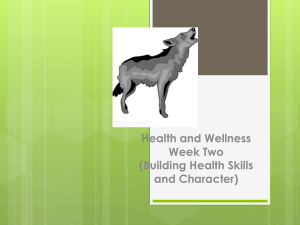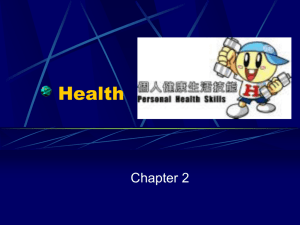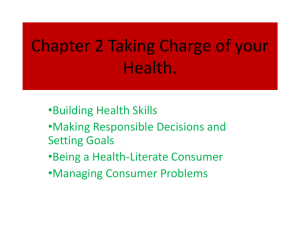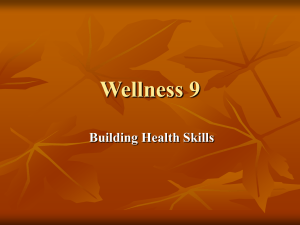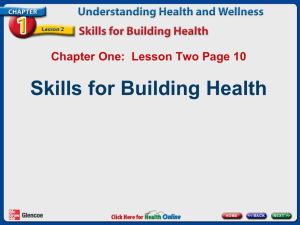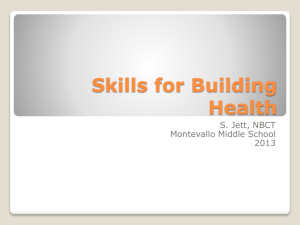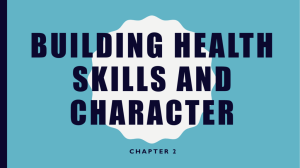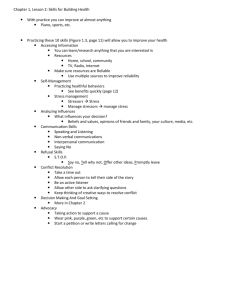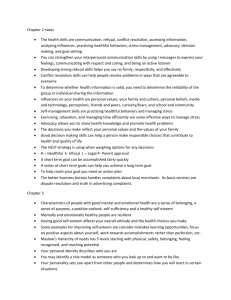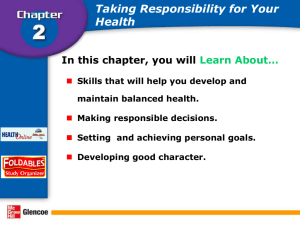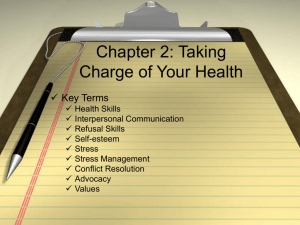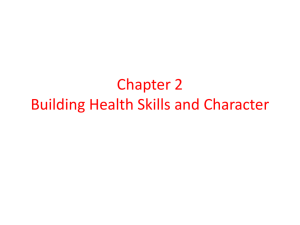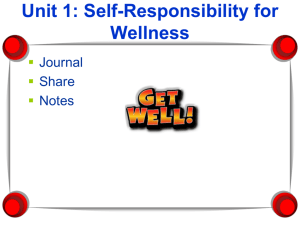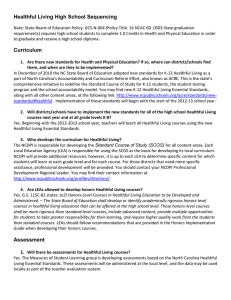File
advertisement
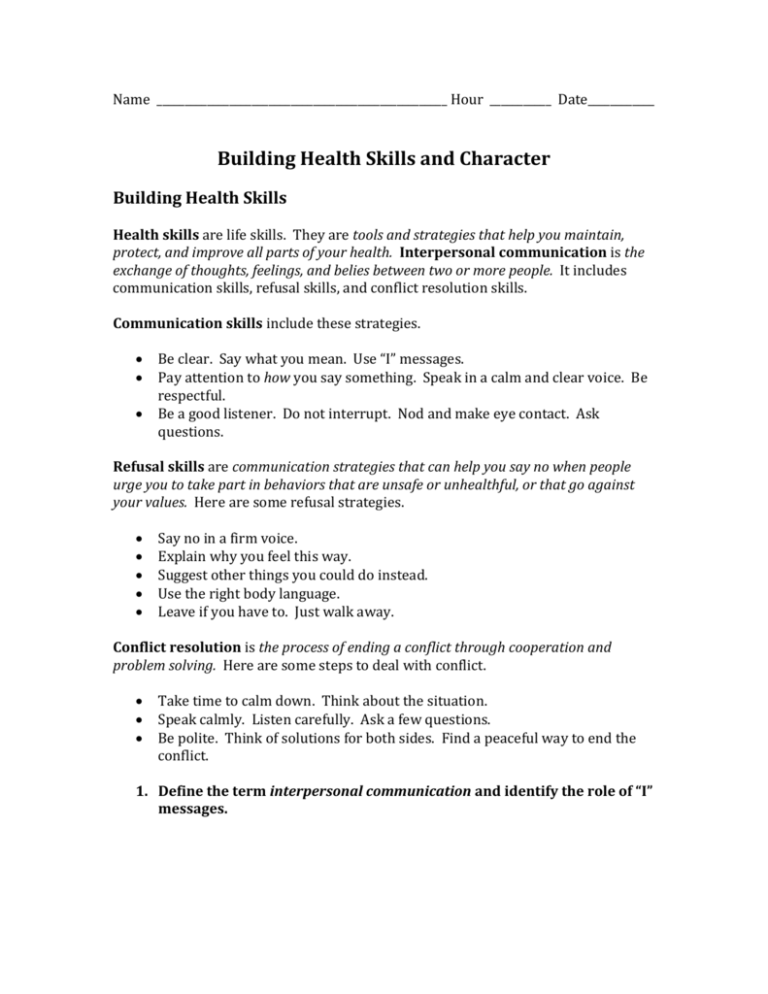
Name ____________________________________________________ Hour ___________ Date____________ Building Health Skills and Character Building Health Skills Health skills are life skills. They are tools and strategies that help you maintain, protect, and improve all parts of your health. Interpersonal communication is the exchange of thoughts, feelings, and belies between two or more people. It includes communication skills, refusal skills, and conflict resolution skills. Communication skills include these strategies. Be clear. Say what you mean. Use “I” messages. Pay attention to how you say something. Speak in a calm and clear voice. Be respectful. Be a good listener. Do not interrupt. Nod and make eye contact. Ask questions. Refusal skills are communication strategies that can help you say no when people urge you to take part in behaviors that are unsafe or unhealthful, or that go against your values. Here are some refusal strategies. Say no in a firm voice. Explain why you feel this way. Suggest other things you could do instead. Use the right body language. Leave if you have to. Just walk away. Conflict resolution is the process of ending a conflict through cooperation and problem solving. Here are some steps to deal with conflict. Take time to calm down. Think about the situation. Speak calmly. Listen carefully. Ask a few questions. Be polite. Think of solutions for both sides. Find a peaceful way to end the conflict. 1. Define the term interpersonal communication and identify the role of “I” messages. 2. What are the advantages of peacefully resolving conflicts? Self-Management Skills Self-management skills include practicing healthful behaviors and managing stress. Practicing healthful behaviors means that you eat nutritious foods. It means that you wear safety gear. It means that you get regular checkups. You stay away from tobacco, alcohol, and other drugs. You express your feelings in healthy ways. You have healthy friendships. Stress management is ways to deal with or overcome the negative effects of stress. Some ways to deal with stress are engaging in physical activity, listening to soft music, using your time wisely, and laughing. 3. What is stress management? List at least three strategies you used during the past week to relieve stress. Which strategy helped the most? Analyzing Influences Many factors affect your health. Internal influences are what you know, your likes and dislikes, your values, and your desires. You have control over these. External influences come from outside sources like your family, your peers, where you live, your culture, laws, and the media. You can make better health choices when you know what influences your. 4. Why is it important to recognize and analyze the various influences on your behavior? Accessing Information How can you find out more about health issues? Here are some of the reliable sources of health information Parents and guardians and other trusted adults. The library; books on nutrition and fitness Internet sites such as government sites Newspaper and magazine articles by health experts Government agencies, health care providers, and health care organizations 5. What are some steps you can take to become a health-literate individual? Advocacy Advocacy is taking action to influence others to address a health concern or to support a health related belief. This skill can help you affect the health of others. You can tell others about health issues. You can help your family and your friends practice healthy behavior. 6. How can advocacy help you with health issues that are important to you? Making Responsible Decisions and Setting Goals The Decision-Making Process Decision-making skills are steps that enable you to make a healthful decision. Here are the steps of the decision-making process. Step 1: State the situation. Think about the facts. Step 2: List the options. What are your choices? Step 3: Weigh the possible outcomes. Use the H.E.L.P. method. Healthful. Is this choice a health risk? Ethical. Do you believe this is the right thing to do? Legal. Is it against the law? Parent approval. Would your parents approve? Step 4: Consider values. Values are the ideas, beliefs, and attitudes about what is important. They help guide the way you live. Step 5: Make a decision and act on it. Step 6: Evaluate the decision. What was the outcome? How did it affect your health? 7. Identify a major health-related decision that teens might have to make. How can teens access information and use decision-making skills to make an informed choice that promotes individual health? Setting Personal Health Goals A goal is something you aim for that takes planning and work. A short-term goal is a goal that you can reach in a short period of time. A long-term goal is a goal that you plan to reach over an extended period of time. An action plan is a multistep strategy to identify and achieve your goals. Here are the steps in an action plan. Set a goal and write it down. Be specific. Be realistic. List the steps you will take to meet your goal. Break your goal into smaller goals. Identify sources of help. List the names of people who can help and support you. Set a time frame to reach your goal. Be reasonable. Write it down. Evaluate your progress. Check how you are doing. Adjust your goals if you need to. Reward yourself when you reach your goal. 8. Why would you set a health goal? Give an example of one short-term and one long-term goal related to improving physical fitness. 9. Explain and defend this statement: Decision making and goal setting are interrelated. Building Character What Is Good Character? Character is those qualities that describe how a person thinks, feels, and behaves. A person with good character has core ethical values. Some of these values are responsibility, honesty, integrity, and respect. These values help you to know right from wrong. They are important to all cultures and age groups. 10. What is character? How is good character related to values? Character and Health Your character affects all sides of your health triangle. You will take care of your body if you respect yourself. Your mental/emotional and social health will improve when you feel good about yourself. Here are the six primary traits of good character. Trustworthiness means you are honest, loyal, and reliable. It means you do what you say you will do. You do not cheat or steal. Respect means you are considerate of others. You tolerate differences in others. You use good manners. You treat people and property with care. Responsibility means you have self-control. You think before you act. You do not blame others for your actions. You always do your best. Fairness mean you play by the rules. You take turns and share. You listen to others. You do not take advantage of or blame others. Caring means you are kind to others. You are grateful for things You forgive others. You help people who are in need. Citizenship means you obey laws and rules. You respect authority. You are a good neighbor. You try to make your school a safe and healthy place. 11. Why do you think that caring, responsibility, and respect are values that exist across cultures? Developing Your Character Here are some of the ways that you can develop good character. Stand up for your beliefs. Learn from others who have good character traits. Be a volunteer at your school or in your community. Make friends with people who have core ethical values. A role model is someone whose success or behavior serves as an example for others. Family members can be good role models. They can teach you basic values such as working hard, planning ahead, and being honest. Other role models might be teachers or coaches. 12. Describe how role models help in forming identity. Demonstrating Character Here are some of the ways you can demonstrate or show good character. Make a difference at home. You demonstrate that you are trustworthy and reliable at home when you are responsible and do your chores. Make a difference at school. You show you have respect for teachers and fellow students when you follow school rules. Make a difference in your community. You show you are a good citizen when you obey the laws and respect other people. You show you have good character when you have a positive effect on others. 13. List three ways of demonstrating good character in your home, your school, and your community.
